
Christian Democracy was a Christian democratic political party in Italy. The DC was founded on 15 December 1943 in the Italian Social Republic as the nominal successor of the Italian People's Party, which had the same symbol, a crusader shield. As a Catholic-inspired, centrist, catch-all party comprising both centre-right and centre-left political factions, the DC played a dominant role in the politics of Italy for fifty years, and had been part of the government from soon after its inception until its final demise on 16 January 1994 amid the Tangentopoli scandals. Christian Democrats led the Italian government continuously from 1946 until 1981. The party was nicknamed the "White Whale" due to its huge organisation and official colour. During its time in government, the Italian Communist Party was the largest opposition party.
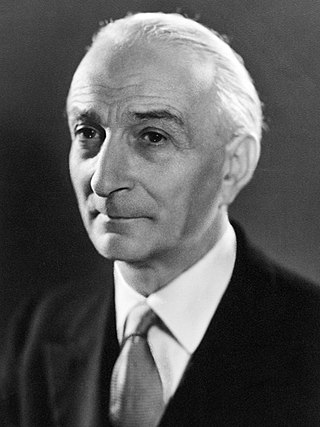
Antonio Segni was an Italian politician and statesman who served as the president of Italy from May 1962 to December 1964, and as the prime minister of Italy in two distinct terms between 1955 and 1960.

Arnaldo Forlani was an Italian politician who served as the prime minister of Italy from 1980 to 1981. He also held the office of deputy prime minister, minister of foreign affairs, and minister of defence.

Mariano Rumor was an Italian politician and statesman. A member of the Christian Democracy (DC), he served as the 39th prime minister of Italy from December 1968 to August 1970 and again from July 1973 to November 1974. As prime minister, he led five different governments, supported by various coalitions.

Amintore Fanfani was an Italian politician and statesman, who served as 32nd prime minister of Italy for five separate terms. He was one of the best-known Italian politicians after the Second World War and a historical figure of the left-wing faction of Christian Democracy. He is also considered one of the founders of the modern Italian centre-left.
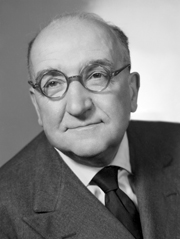
Adone Alvaro Ugo Natale Camillo Zoli was an Italian politician who served as the 35th prime minister of Italy from May 1957 to July 1958; he was the first senator to have ever held the office.

Fernando Tambroni Armaroli was an Italian politician. A member of Christian Democracy, he served as the 36th Prime Minister of Italy from March to July 1960. He also served as Minister of the Interior from July 1955 until February 1959, Minister of Budget and Treasury from February 1959 to March 1960, and Minister of the Merchant Navy from August 1953 until July 1955.
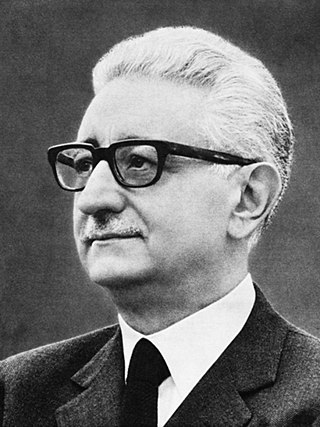
Giovanni Leone was an Italian politician, jurist and university professor. A founding member of the Christian Democracy (DC), Leone served as the president of Italy from December 1971 until June 1978. He also briefly served as Prime Minister of Italy from June to December 1963 and again from June to December 1968. He was also the president of the Chamber of Deputies from May 1955 until June 1963.

Giuseppe Pella was an Italian Christian Democratic politician who served as the 31st prime minister of Italy from 1953 to 1954. He was also Minister of Treasury, Budget and of Foreign Affairs during the 1950s and early 1960s. Pella served as President of the European Parliament from 1954 to 1956 after the death of Alcide De Gasperi.

The 1958 Italian general election was held in Italy on 25 May 1958. The number of MPs to be elected was calculated upon the population's size for the last time.

The 1963 Italian general election was held on Sunday April 28. It was the first election with a fixed number of MPs to be elected, as decided by the second Constitutional Reform in February 1963. It was also the first election which saw the Secretary of Christian Democracy to refuse the office of Prime Minister after the vote, at least for six months, preferring to provisionally maintain his more influent post at the head of the party: this fact confirmed the transformation of Italian political system into a particracy, the secretaries of the parties having become more powerful than the Parliament and the Government.

The Legislature II of Italy was the 2nd legislature of the Italian Republic, and lasted from 25 June 1953 until 11 June 1958. Its composition was the one resulting from the general election of 7 June 1953.

The Legislature III of Italy was the 3rd legislature of the Italian Republic, and lasted from 12 June 1958 until 15 May 1963. Its composition was the one resulting from the general election of 25 May 1958.

The Legislature IV of Italy was the 4th legislature of the Italian Republic, and lasted from 16 May 1963 until 4 June 1968. Its composition was the one resulting from the general election of 28 April 1963.

The 1978 Italian presidential election was held in Italy between 29 June and 8 July 1978, following the resignation of incumbent President Giovanni Leone on 15 June 1978 because of the Lockheed bribery scandals.

The 1971 Italian presidential election was held in Italy on 9–24 December 1971.

The 1962 Italian presidential election was held in Italy on 2–6 May 1962.
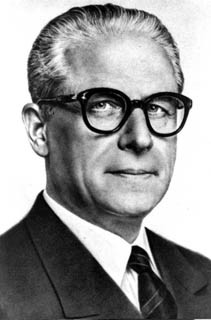
The 1955 Italian presidential election was held in Italy on 28–29 April 1955. Giovanni Gronchi, President of the Chamber of Deputies, was elected President of Italy
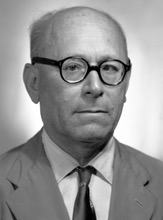
Umberto Elia Terracini was an Italian politician.


















